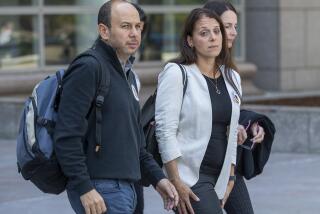McVeigh Attorneys Allege Misconduct
- Share via
DENVER — Defense attorneys in the Oklahoma City bombing case asked a federal judge on Thursday to disqualify two prosecutors and to suppress a “powerful” piece of evidence that tends to link Timothy J. McVeigh to preparations for carrying out the terrorist attack that killed 168 people and injured 850.
The defense lawyers are alleging government misconduct that led to a key prosecution witness belatedly remembering that McVeigh could have been the person who telephoned a Kansas rental agency to arrange for the Ryder truck prosecutors say was used to bomb the Alfred P. Murrah Federal Building.
U.S. District Judge Richard P. Matsch said that he will rule later on the defense requests.
The witness, Thomas Manning, manager of a Junction City, Kan., tire store, told FBI agents and prosecutors in nearly a dozen interviews that he sold McVeigh a yellow Mercury Marquis on April 14, 1995. Prosecutors contend that McVeigh used the Mercury as a getaway car to flee the scene of the bombing five days later.
But Manning did not recall until one of his final interviews with prosecutors that, while McVeigh was at his store, he left for about 15 minutes. “I distinctly remember him being gone for a short period of time,” Manning said.
It is roughly during that time that the government contends McVeigh used a pay phone near the tire story to call co-defendant Terry L. Nichols and the Ryder agency to set up the truck rental.
Defense attorneys for McVeigh suggested that prosecutors prodded Manning to come up with that recollection for Manning’s story to fit the government’s own timeline of events.
“What kind of behind-the-ball game are we playing here?” lawyer Stephen Jones asked Matsch.
Michael E. Tigar, lead attorney for Nichols, asked the judge to disqualify prosecutor Larry Mackey from the trial because of his involvement in the Manning interviews.
Tigar also asked that another prosecutor, Scott Mendeloff, be disqualified for “shaping” the recollections of another witness, Richard Schlender, who worked at a Kansas grain company where the defendants allegedly purchased the fertilizer used to help make the bomb used to destroy the building. He declined, however, to say what it was Mendeloff did to change Schlender’s story.
Joseph Hartzler, the chief prosecutor, strongly defended his government team of lawyers and denied that any of his fellow prosecutors had “coached” Manning into recalling that McVeigh had left the tire store for a short time and then returned.
“These two phone calls are powerful evidence in this case,” he said. “But we know what our responsibility is. And I believe we are fulfilling that responsibility. This is an honorable group.”
McVeigh is to stand trial March 31, with Nichols’ trial to follow.
More to Read
Sign up for Essential California
The most important California stories and recommendations in your inbox every morning.
You may occasionally receive promotional content from the Los Angeles Times.













